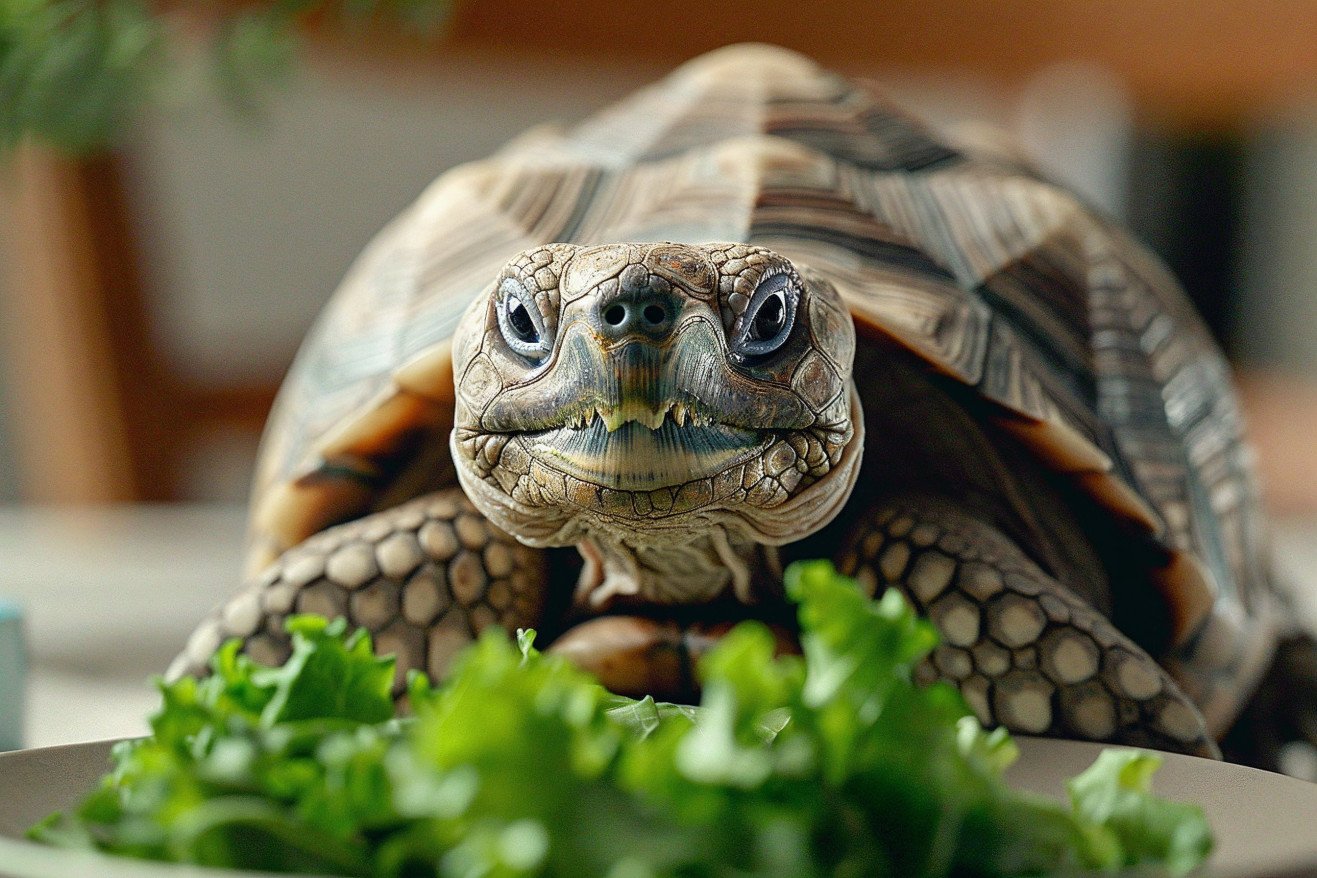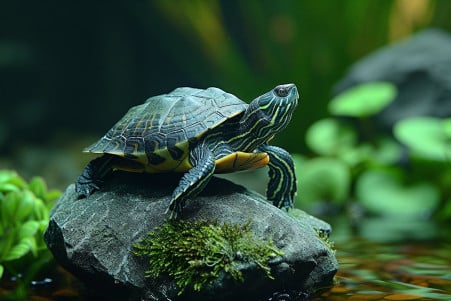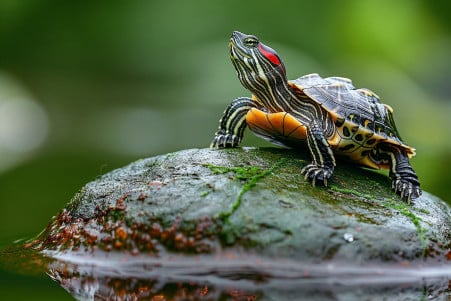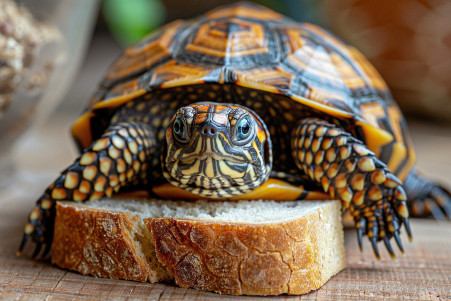Why Won't My Turtle Eat? Common Causes and Solutions
17 April 2024 • Updated 16 April 2024

If your pet turtle has stopped eating, you may be worried, but there are many reasons this could be happening, from environmental to health-related. Find out why your turtle may not be eating, including stress, temperature or lighting issues, illness, or improper diet - by paying close attention to your turtle's environment and behavior, you can figure out what's going on and help your turtle get back to eating normally.
We've referenced veterinary professionals, turtle hobbyists, and scientific research to bring you a comprehensive look at the many things that can affect a turtle's appetite. By learning about the many things that can affect a turtle's diet, including their dietary needs, habitat needs, potential health issues, and natural tendencies, you can better understand what may be going on and how to help your turtle eat well.
Why is my turtle not eating?
Making Sure the Environment Is Right for Healthy Eating
Making sure that your turtle's environment is right for healthy eating is important for maintaining their appetite and natural feeding behaviors. As explained by WebMD, turtles need the water and basking areas in their tanks to be at specific temperatures to ensure proper digestion. This includes a basking area that's between 90-95°F (32-35°C) and water temperatures that are appropriate for the species.
Turtles also need to be exposed to the right kind of light, including UVA/UVB rays from either a lamp or the sun, to help them get the nutrients and vitamins they need to maintain their appetite and other aspects of their health. In addition, a tank that has hiding places, a stable basking area, and as little disruption as possible will help keep your turtle from getting stressed, which can lead to a loss of appetite.
For turtles that live in water, keeping the tank clean and using a filter will help ensure that the water quality is good, which is important for healthy eating. Many of the issues that cause turtles to stop eating can be resolved by adjusting things like temperature, light, and the way the tank is set up. That said, if your turtle's lack of appetite persists, it could be a sign of an underlying health issue that needs to be addressed by a vet.
Providing a Balanced and Healthy Diet for Picky Eaters
Turtles are omnivores, so they need a mix of animal and plant-based foods to stay healthy, says WebMD. Offering a variety of live food, cooked meat, leafy greens, and fruit can help make sure your picky turtle is getting the nutrition they need. The PetHelpful article explains that while wild turtles eat aquatic plants and small animals, they are not adapted to the hard, tasteless store-bought veggies that are often recommended.
To make sure your turtle is getting a well-rounded diet, you should use commercial turtle pellets or sticks as a base and then add in fresh, whole foods. TurtleCare.net recommends that you introduce new foods slowly and try offering them in different ways, like floating or sinking, to see if that entices your picky eater. A vet or experienced turtle owner can help you figure out the best diet and feeding routine for your turtle's needs.
Identifying and Dealing With Medical Conditions That Impact Appetite
If a turtle has a consistently low appetite that lasts for more than a few days, it may be a sign of an underlying medical condition, according to the PetHelpful article. Turtles are known to suffer from a variety of common health issues, including respiratory infections, parasites, and vitamin deficiencies, all of which can lead to a loss of appetite. As the JustAnswer discussion points out, you should also look for other symptoms, such as lethargy, weight loss, and changes in behavior.
If a turtle is still not eating after you’ve made changes to its diet and environment, it’s important to see a reptile vet for a proper diagnosis and treatment. As the JustAnswer discussion explains, it’s important to make sure that any medical issues are dealt with because that’s the only way to make sure that a turtle’s appetite and overall health are restored. By keeping a close eye on your turtle’s health and making sure to see a vet when necessary, you can make sure that you get to the bottom of the problem and help your pet get back to its normal eating habits.
How to Get a Turtle to Eat After Sickness or Fasting
As mentioned by TurtleCare.net, it is important to slowly reintroduce a turtle to food after a period of fasting or an illness. This can be done by feeding the turtle easily digestible, nutrient-rich foods such as cooked meats or liquid vitamin supplements. The article also recommends gently prying the turtle’s mouth open and placing small amounts of food in its mouth to help stimulate its appetite.
As noted in the PetHelpful article, it is important to make sure that the turtle’s environment is kept at the proper temperature to help the turtle recover and feel well enough to eat. The author explains that the three most important things to do to help a sick aquatic turtle are to keep it warm, give it vitamins, and keep its tank clean.
Getting advice from a vet can help ensure that you are using the best practices to help your turtle start eating again and avoid any further health issues. In the JustAnswer discussion, the vet explains that a turtle’s constant hunger could be a sign of an underlying issue, such as intestinal parasites, that would need to be diagnosed and treated by a professional.
Knowing What's Normal and Recognizing Signs of Starvation
The length of time that a turtle can safely go without eating varies based on their age and life stage. As stated by AllTurtles, hatchlings and juveniles need to be fed every day, while adults can go 2-3 days without eating when they're not in brumation. When in brumation, which is a state of dormancy similar to hibernation, adult turtles can go 11-16 weeks without eating.
That said, long-term starvation can lead to a number of health issues and can even be fatal, so it's important to keep an eye on a turtle's condition. As mentioned in the JustAnswer discussion, signs of starvation in turtles include extreme lethargy, sunken eyes, visible bones, and a significant loss of weight. It's important to treat any underlying issues and get a turtle back to eating normally to ensure their health.
Conclusion: How to Get Your Turtle Eating Again
To address a turtle's lack of appetite, it's important to understand the potential environmental, dietary, and health-related causes. Making sure that you have the right habitat conditions and that your turtle is eating a balanced diet that includes a variety of foods is important, as is making sure that any medical issues are addressed.
It's also important to be patient and to monitor your turtle closely as you work to get it to start eating again after it has been sick or has gone a long time without eating. If you're not sure how to help your turtle start eating again, you can ask a reptile veterinarian or an experienced turtle keeper for advice. With the right care and attention, most turtles can be encouraged to start eating again and can maintain a healthy appetite.


